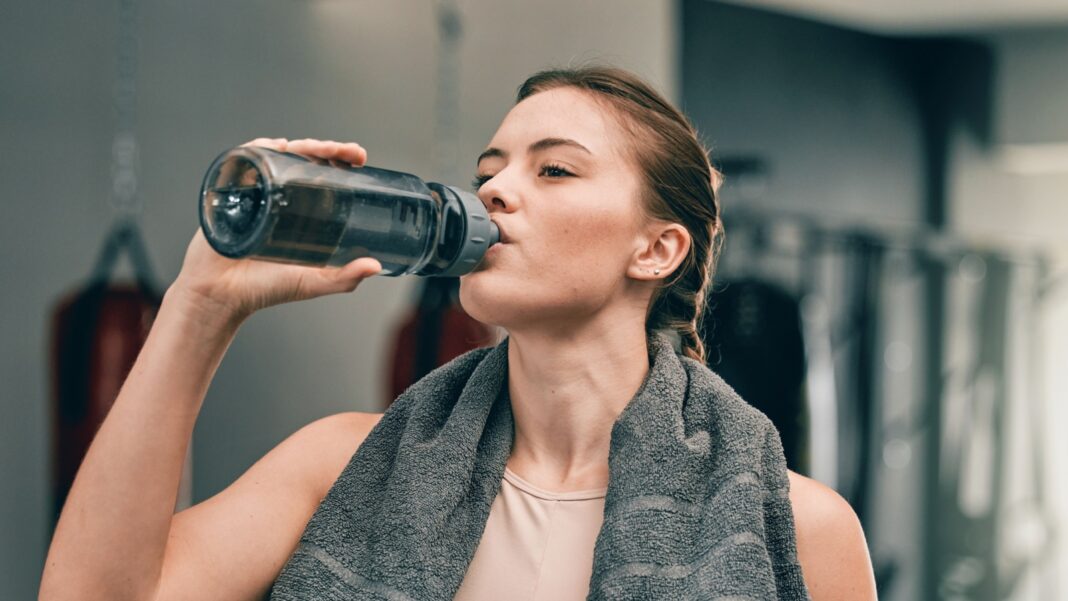“Drink more water” is among the most common weight loss advice — but a new study indicates it might not be that big of a deal.
Want to lose fat? Drink more water. That’s what you’ll hear from just about every personal trainer, diet pamphlet, or online guru. But a new study analyzing the effects of increased water intake on obesity is casting doubt on the whole idea.

If you’re trying to change your body composition or lose fat, you need as many factors working in your favor as possible. We’re going to unpack this study, assess its merit, and give you our practical interpretation so you can know just how much water is enough to assist your weight loss efforts.
BarBend
What the Study Says
The paper in question is a Mar. 2024 systematic review and meta analysis published in the journal .
Titled “Water Intake and Adiposity Outcomes among Overweight and Obese Individuals: A Systematic Review and Meta-Analysis of Randomized Controlled Trials” (1), authors Chen et al. set about analyzing the effects of water consumption in studies of overweight or obese patients trying to lose weight.
- Methods: The scientists collected existing papers that met their inclusion criteria of increasing water intake or substituting caloric beverages for water to aid weight loss efforts.
Findings
The authors amassed eight individual studies tallying a total of 1,034 participantsall of which passed their inclusion criteria of being either overweight or obese. Here’s what they determined after looking at the evidence:
- Between all studies that either increased subjects’ water intake or substituted caloric beverages like soda for water, cumulative average weight loss landed around .72 pounds.
- In studies which specifically swapped sugar-laden drinks for water, subjects lost roughly 1.78 pounds on average.
- In studies which specifically swapped “artificially sweetened” beverages for water, subjects lost about four pounds on average.
Put Simply: Drinking water instead of other beverages created positive trends in weight loss, but the differences aren’t as substantial as you might think.
From the Authors: “water intake may not significantly impact [body fat levels] among overweight and obese individuals. However, replacing sugar-sweetened beverages with water might offer a modest benefit in inducing weight loss.”
Limitations
Systematic reviews and meta analyses are generally considered to be top-shelf forms of scientific evidence, but that doesn’t mean this paper shuts down the case for water intake as it relates to weight loss.
While Chen & colleagues did examine a total of 1,034 participants, they did only collect eight studies in total — a relatively small amount given the broad applicability of this research. Moreover, this study did not directly conduct any long-term experiments on drinking water instead of soda or another calorie-dense beverage. It examined existing data and inferred conclusions.
Should You Drink Water for Weight Loss?
Yes. But not because water has any directly-applicable properties that fat loss. Fat loss is simple thermodynamics — internally, you need to expend more energy than you burn, and sustain that “energy deficit” over time.
Here’s where the study stands on the firmest ground:
- Water intake by itself didn’t significantly influence body fat levels, but drinking water instead of sweetened or sugary beverages did. In real-world terms, this makes perfect sense. If you opt out of an eight-ounce glass of soda, you’ll reduce your caloric intake by about 120 calories.
This information is only actionable if you’ve got a sense how many calories you should eat per day; the amount of energy you require to maintain your weight at your current physical activity levels. Try out ‘s calorie calculator to see where you’re at:
If you’re struggling to maintain your weight or are gaining weight, you are in a calorie surplus, and shaving some of that excess energy off your “budget” by drinking water instead will likely create meaningful change.
More Science on
FAQs
Does water help with weight loss?
According to this 2024 meta analysis, water has a very modest effect on weight loss in overweight or obese individuals. However, substituting calorie-dense beverages like soda or alcohol for water is a practical way to enter a calorie deficit, provided you’re making sensible meal choices in the kitchen as well.
How much water should you drink to lose weight?
Your water intake regulates many bodily processes influences performance; one study showed a five-percent decrease in both strength and endurance among athletes who didn’t hydrate properly. (2)
To ensure you’re hydrating properly, the Mayo Clinic recommends men consume 3.7 liters, and women 2.7 liters, of water per day.
Does coffee dehydrate you?
You may have heard that coffee can have a dehydrating effect — but studies indicate that the hydrating properties of coffee and water are quite comparable. (3)
References
- Chen, Q. Y., Khil, J., & Keum, N. (2024). Water Intake and Adiposity Outcomes among Overweight and Obese Individuals: A Systematic Review and Meta-Analysis of Randomized Controlled Trials. , (7), 963.
- Savoie, F. A., Kenefick, R. W., Ely, B. R., Cheuvront, S. N., & Goulet, E. D. (2015). Effect of Hypohydration on Muscle Endurance, Strength, Anaerobic Power and Capacity and Vertical Jumping Ability: A Meta-Analysis. , (8), 1207–1227.
- Maughan, R. J., Watson, P., Cordery, P. A., Walsh, N. P., Oliver, S. J., Dolci, A., Rodriguez-Sanchez, N., & Galloway, S. D. (2016). A randomized trial to assess the potential of different beverages to affect hydration status: development of a beverage hydration index. , (3), 717–723.




